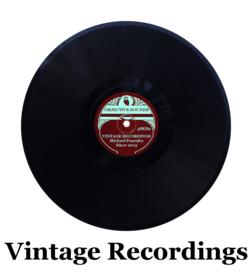
This recording was transferred, digitally restored and kindly made available to me by Julian Dyer.
Ambrose switched record companies a number of times, starting with Colombia in the early 1920s and a remarkably fruitful period with HMV 1930-34. He had two periods with Decca, a short one in 1929-30 and after his HMV period stayed with Decca for the rest of his recording career. Many enthusiasts regard his HMV years as the best band of the period.
| Composer | Arthur W. Black |
|---|---|
| Work | Punch and Judy Show |
| Conductor | Bert Ambrose |
| Date Recorded | 29th January 1930 |
| Recording Location | London (Chenil Galleries, Chelsea) |
| Date Restored | 14th October 2014 by Julian Dyer |
| Serial Number | Decca M118 (matrix MB906-1A) |
| Recording Cutter | Western Electric 1A |
| Bandwidth | 50Hz to 6kHz |
| Transfer Stylus | 2.5mil truncated conical |
| Transfer Cartridge | Shure M75 |
| Transfer Turntable | Lenco L75 at 78RPM |
| Cutter Compensation | 375Hz first order lift |
| Click Reduction | ClickRepair, wavelet x3 mode, DeClick 40, pitch protection, reverse, stereo |
| Crackle Reduction | ClickRepair, DeCrackle, wavelet, 5 stereo passes |
| Low Frequency NR | DeNoise LF at 50 Hz |
| Wideband NR | DeNoise, auto, -12dB reduction |
| Limiting Filter | 48dB/octave Butterworth, at bandwidth limits |
This excellent transfer and restoration, originally listed on YouTube was completed by Julian Dyer using Brian Davies' restoration software. I have also applied a few of my own Butterworth bandwidth limiting filters to this work, along with some very mild peak limiting to bring the level up a bit.
Decca introduced their own records in 1929 having previously been a gramophone manufacturer. The M series records were the earliest Decca recordings, and leave a lot to be desired from a recording viewpoint. They gradually improved and by the time this side was made could achieve quite acceptable sound quality. They were also poorly advertised, so all M-series discs are extremely scarce.
With the permission of the original transfer engineer, I have made this work available for free download.
Vorbis is used for site downloads as it provides transparency at about a third of the file size compared to MP3. There isn't really much point for using FLAC as the final listening format (all processing is done losslessly, of course) as the quality of the recordings themselves is already rather limited given their age. The general consensus on HydrogenAudio is that Q5 is enough for transparency with modern recordings, so the downloads offered are encoded at a more than ample Q7. Vorbis is by far a superior codec to MP3, as transparency is obtained at almost half the file size.
The audio track listed on this page is a digital restoration of a 78 RPM record, whose mechanical copyright has expired before the time of this page's publication. No later release is used so any copyright affecting such a release does not apply to any of the sound recordings shown on this page. Claims to the contrary may be vexatious if pursued. Any communication between parties claiming copyright of the material on this website and the author of this site will be published immediately with great derision. The contents of this page must not be copied represented or sold without express permission.
Julian Dyer and Michael Fearnley 2016